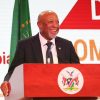Omanyano ovanhu koikundaneki yomalungula kashili paveta, Commisiner Sakaria takunghilile
Veronika Haulenga
Omanyano ovanhu koikundaneki yomalungula kashili paveta, Commisiner Sakaria takunghilile
Veronika Haulenga
Listeners:
Top listeners:
-
play_arrow
Omanyano ovanhu koikundaneki yomalungula kashili paveta, Commisiner Sakaria takunghilile Veronika Haulenga

By Mauriza Fredericks, Group Brand Manager, Old Mutual Namibia
Money is a subject that often stirs unease, even within family circles. However, open and honest discussions about finances are indispensable for fostering trust and ensuring financial stability. In Namibia, where family bonds hold great significance, it’s crucial to approach these conversations with sensitivity. This article delves into the art of conversing about money with three essential family groups: spouses, children, and extended family members.
Talking to Your Spouse/Partner
Communication serves as the bedrock of any strong marriage or partnership. When it comes to discussing money with your spouse in Namibia, establishing a solid foundation is paramount. Setting aside dedicated time for financial
talks is the first step. Choosing a peaceful and uninterrupted setting creates a non-judgmental atmosphere that encourages honest dialogue.
By openly sharing your financial goals and collaborating to construct a household budget, you ensure that both partners are on the same page. Honesty about debts is crucial, as it lays the groundwork for managing and paying off debts as a team. In cases of financial complexity, the option of consulting a financial advisor in Namibia can provide much-needed guidance.
Talking to Your Children
Instilling financial literacy in your children is an invaluable life skill. Teaching children about money from an early age lays the foundation for sound financial habits and decision-making. It starts with age-appropriate conversations, using simple language and tangible examples for younger children, while introducing more complex concepts as they grow.
Encouraging savings and involving children in setting up savings accounts are essential steps. Providing children with an allowance teaches them budgeting, goal setting, and responsible decision-making. As children mature, engaging them in family financial decisions, such as discussing household budgets or involving them in grocery shopping, can further deepen their financial understanding. Leading by example and demonstrating responsible financial behaviour completes the learning cycle.
Talking to Your Extended Family
In Namibia, the extended family often plays a vital role in our lives. Discussing financial matters with extended family members can be a sensitive affair, particularly when you have financial responsibilities towards them. Open and honest communication is the key to success. Honesty about your own financial situation and setting clear expectations about what you can and cannot afford are essential.
Willingness to compromise and respecting the privacy of your extended family members is also crucial. Organising family meetings dedicated to openly discussing financial issues can be beneficial, preventing misunderstandings
and ensuring everyone is aligned regarding family finances. In conclusion, addressing financial topics within your family may seem daunting, but it’s a necessary step toward ensuring a financially secure future.
Effective communication, setting clear boundaries, and practicing financial responsibility are all vital components for maintaining healthy relationships and financial stability within your family in Namibia. Should you find yourself facing complex financial issues, remember that seeking professional advice from financial experts in Namibia is always a valuable option.
Written by: Contributed
allowance budgeting communication Debt Management family finances financial advisor financial decisions financial discussions financial habits Financial Literacy Financial Stability household budget Namibia professional financial advice savings
Windhoek Weather
Most popular

Mbumba signs off new benefits for retired political office bearers

Former FNB employee arrested after defraud pensioner off N$215, 000

Namdia Heist: More questions, lots of confusion

Omuhwahwameki Michael okuunganeka oshikonga shoku patitha oostola dho Rani moshilongo ashihe.

Windhoek woman loses N$60,000 to fraudsters
Copyright 2025 Future Media (Pty) Ltd | Website by Digital Platforms
Tel: +264 83 000 1000 | Email: news@futuremedia.com.na






